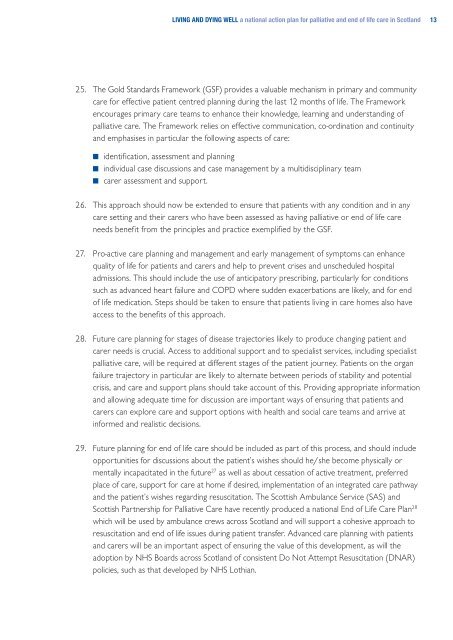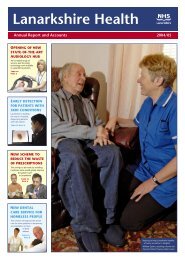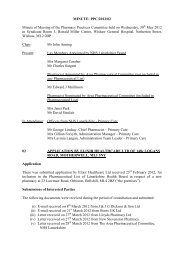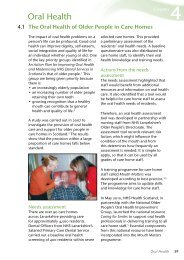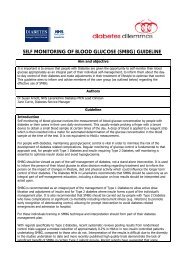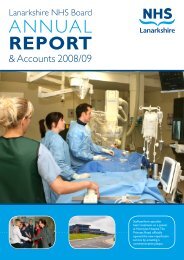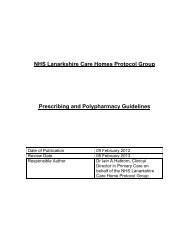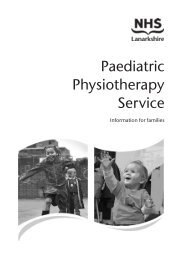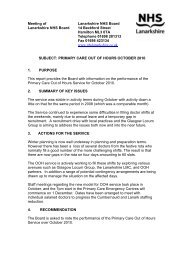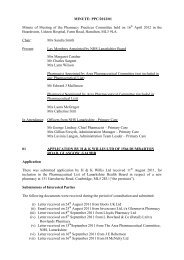Living and Dying Well - Scottish Government
Living and Dying Well - Scottish Government
Living and Dying Well - Scottish Government
You also want an ePaper? Increase the reach of your titles
YUMPU automatically turns print PDFs into web optimized ePapers that Google loves.
LIVING AND DYING WELL a national action plan for palliative <strong>and</strong> end of life care in Scotl<strong>and</strong><br />
13<br />
25. The Gold St<strong>and</strong>ards Framework (GSF) provides a valuable mechanism in primary <strong>and</strong> community<br />
care for effective patient centred planning during the last 12 months of life. The Framework<br />
encourages primary care teams to enhance their knowledge, learning <strong>and</strong> underst<strong>and</strong>ing of<br />
palliative care. The Framework relies on effective communication, co-ordination <strong>and</strong> continuity<br />
<strong>and</strong> emphasises in particular the following aspects of care:<br />
■ identification, assessment <strong>and</strong> planning<br />
■ individual case discussions <strong>and</strong> case management by a multidisciplinary team<br />
■ carer assessment <strong>and</strong> support.<br />
26. This approach should now be extended to ensure that patients with any condition <strong>and</strong> in any<br />
care setting <strong>and</strong> their carers who have been assessed as having palliative or end of life care<br />
needs benefit from the principles <strong>and</strong> practice exemplified by the GSF.<br />
27. Pro-active care planning <strong>and</strong> management <strong>and</strong> early management of symptoms can enhance<br />
quality of life for patients <strong>and</strong> carers <strong>and</strong> help to prevent crises <strong>and</strong> unscheduled hospital<br />
admissions. This should include the use of anticipatory prescribing, particularly for conditions<br />
such as advanced heart failure <strong>and</strong> COPD where sudden exacerbations are likely, <strong>and</strong> for end<br />
of life medication. Steps should be taken to ensure that patients living in care homes also have<br />
access to the benefits of this approach.<br />
28. Future care planning for stages of disease trajectories likely to produce changing patient <strong>and</strong><br />
carer needs is crucial. Access to additional support <strong>and</strong> to specialist services, including specialist<br />
palliative care, will be required at different stages of the patient journey. Patients on the organ<br />
failure trajectory in particular are likely to alternate between periods of stability <strong>and</strong> potential<br />
crisis, <strong>and</strong> care <strong>and</strong> support plans should take account of this. Providing appropriate information<br />
<strong>and</strong> allowing adequate time for discussion are important ways of ensuring that patients <strong>and</strong><br />
carers can explore care <strong>and</strong> support options with health <strong>and</strong> social care teams <strong>and</strong> arrive at<br />
informed <strong>and</strong> realistic decisions.<br />
29. Future planning for end of life care should be included as part of this process, <strong>and</strong> should include<br />
opportunities for discussions about the patient’s wishes should he/she become physically or<br />
mentally incapacitated in the future 27 as well as about cessation of active treatment, preferred<br />
place of care, support for care at home if desired, implementation of an integrated care pathway<br />
<strong>and</strong> the patient’s wishes regarding resuscitation. The <strong>Scottish</strong> Ambulance Service (SAS) <strong>and</strong><br />
<strong>Scottish</strong> Partnership for Palliative Care have recently produced a national End of Life Care Plan 28<br />
which will be used by ambulance crews across Scotl<strong>and</strong> <strong>and</strong> will support a cohesive approach to<br />
resuscitation <strong>and</strong> end of life issues during patient transfer. Advanced care planning with patients<br />
<strong>and</strong> carers will be an important aspect of ensuring the value of this development, as will the<br />
adoption by NHS Boards across Scotl<strong>and</strong> of consistent Do Not Attempt Resuscitation (DNAR)<br />
policies, such as that developed by NHS Lothian.


